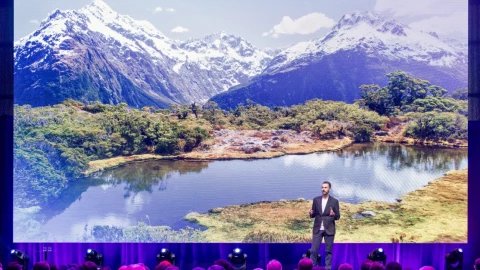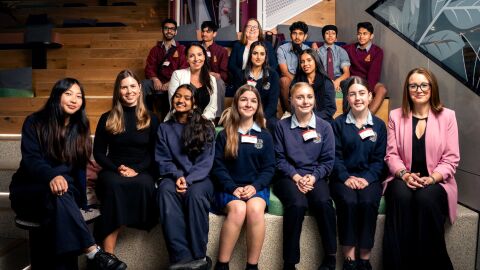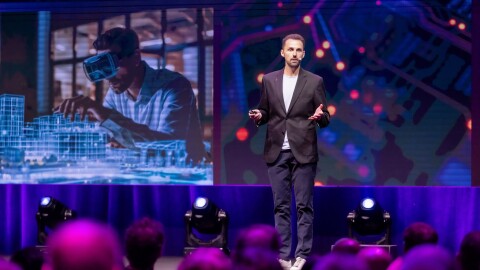Proud Ngarluma traditional owner, Andrew Morumburri Dowding, has spent the best part of two decades working in heritage-focused roles, supporting cultural mapping across Australia – creating visual maps that ensure organisations and governments can make data driven decisions with the right contextual information, such as sacred sites, natural land features and other culturally significant features. Andrew’s connections with the Ngarluma community in the Pilbara region of Western Australia flow through his family, and his passion for enabling and hiring First Nations peoples runs deep.
In 2018, Andrew co-founded Winyama, an Indigenous-owned and operated IT consultancy in Perth, Western Australia. Winyama serves two purposes. First, as a geospatial location intelligence and digital solutions provider to Indigenous communities tasked with important work such as managing and preserving their land and the environment. Second, as an enabler of young Indigenous talent seeking careers in technology. Andrew was acutely aware that to create an Indigenous-owned and run company, he not only needed to establish the technology underpinning Winyama, but he also needed to build the professional skills and capability of his team to deliver on the businesses’ goals.
Upskilling rangers to capture First Nations information at scale
Throughout his career, Andrew has seen first-hand the value that technology delivers to geospatial mapping, and recognised an untapped opportunity to help Indigenous Ranger Groups to access such tools to better care for country.
Indigenous Rangers Programs combine traditional knowledge with conservation training to help Indigenous communities protect and manage their land and sea and propagate culture. This includes activities such as bushfire mitigation, protection of threatened species, and biosecurity compliance, for example cool burning and modern drone surveillance at Bunya Mountain Murri Rangers.
Indigenous Ranger Groups also develop partnerships with research, education, philanthropic, and commercial organisations to share skills and knowledge. They also engage with schools, and generate additional income and jobs in the environmental, biosecurity, heritage, and other sectors.
One of Winyama’s core offerings is an Indigenous Mapping Workshop Australia classroom-based training for Indigenous Ranger Groups and Native Title Corporations, helping them become proficient in the use of geospatial tools for capturing data in the field, including sites of significance. The community organisations’ that Winyama trains, often live and work in areas that are challenged by the affordability of the equipment typically needed for geospatial software. They also face issues with access to connectivity and the digital skills needed to connect a multitude of disparate information and geospatial systems. Winyama seeks to upskill these rangers and organisations, training them on mapping technologies and demonstrating how digitising processes lets communities capture valuable First Nations knowledge at scale.
“Since we started in 2019, we’ve trained over 440 Indigenous people across Australia. In the first year, we discovered how time and resource intensive it was to prepare for each in-person training session. Our enablement team had to cart laptops to each training location; sometimes hundreds of kilometres apart, set them up and connect them to various training systems. We needed an online training environment to help standardise the types of training we were delivering, and how each person accessed it.”
As part of Winyama’s cloud native approach, which enables it to operate without significant IT overheads, Winyama used AWS to create a virtual training environment. Its IT Consultant, Tim Cable, of the Noongar traditional owner group, spun it up in AWS AppStream, making it accessible through a URL provided to all attendees. This approach reduced setup time from 2.5 days to minutes, and the cost from $40,000 for 20 high end workstations, to approximately $125 to run a day’s worth of on-demand training for 20 participants. It also meant Indigenous Ranger Groups could bring their own laptops or tablets, using familiar hardware, with the power and speed of a virtual environment that allowed them to build new technical skills across geospatial technologies.
Virtual training democratises access
While in-person training remains important to Winyama’s business, the company sought to create an online training offering that it could deliver across Australia, particularly throughout the coronavirus pandemic when borders were shut between states and territories. Winyama has used AWS to expand availability of its Indigenous Mapping Workshop On-Demand to participants across the country - delivering 176 virtual labs since September 2020. This has enabled it to reach community rangers surveying vast geographic areas, such as The Great Barrier Reef and the Outback Hinterland Region, covering hundreds of thousands of hectares.
The Winyama team has also benefited from online coaching training from AWS. Jaden Dzubiel is a Junior Solution Architect at Winyama, and a Noongar man belonging to the Minang, Kaniyang, Goreng and Whadjuk tribes. He’s one of many team members that’s completed free AWS training to become an AWS Certified Cloud Practitioner. Jaden has also completed a Solutions Architect internship through AWS where he created a machine learning model proof of concept for Winyama.
“We took camera trap footage from the ranger groups – whereby a camera is automatically triggered by movement in its vicinity – split them into timestamps, drew bounding boxes around the animals within the timestamps, and then used machine learning tools to identify the species,” said Jaden. “We could then apply that training model to other images. So instead of a ranger having to spend hours each day looking at footage, we can run the machine learning model against it to specify the species within that part of the Pilbara. It’s an incredibly scalable model and can create additional revenue opportunities for ranger groups using a culturally appropriate service.”
Jaden is also upskilling on various AWS services and consulting practices and will use this knowledge to help Winyama grow as an AWS Partner Network (APN) Consulting Partner and engage with other local IT firms. Winyama recently joined the AWS Think Big for Small Business (TBSB) Program, which offers minority-owned public sector organisations that have registered for the Public Sector Partner Program unique access to business, technical, and marketing enablement support. As part of this program, Andrew and the team are receiving mentoring from AWS to help progress through their AWS Partner journey, and expedited access to AWS Partner benefits and programs, to help Winyama build, market and sell with AWS.
Separate to Winyama’s training focus, Jaden’s colleague Tim is exploring how Winyama can use edge services like AWS Snowcone to help transfer high-resolution photogrammetry from Indigenous Ranger Groups to the cloud. This will help it create 3D digital representations of country and deliver richer visuals for projects. It will also allow groups to undertake online consultations with mining and industry to ensure culturally significant areas are protected.
Thinking big for Winyama’s future
Winyama’s story is a powerful example of how one organisation is driving digital inclusion in technology across Australia. At Amazon, we recognise the need for reconciliation with First Nations people, and we acknowledge the importance of taking meaningful steps to improve the lives of all Aboriginal and Torres Strait Islander peoples. We’re proud to support Winyama and know there’s great opportunities for more enterprises and government organisations to engage with First Nations businesses and combine traditional, age-old cultural knowledge, and modern innovation to drive digital transformation.
Learn more about Winyama at https://www.winyama.com.au/. Interested in Amazon Web Services’ training programs? Access over 500 free digital training programs at https://aws.amazon.com/training/.











